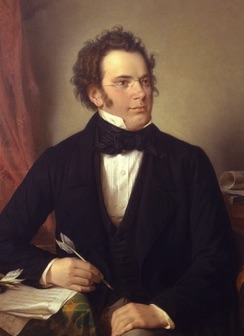
Franz Peter Schubert was born on 31 January 1797 in a suburb of Vienna. At a very early age, his musical prodigy became evident and in 1808, at the age of eleven, he became a pupil at the Stadtkonvikt school, where he discovered the orchestral works of Haydn, Mozart, and Beethoven. He left the Stadtkonvikt at the end of 1813, and continued his studies in composition with Antonio Salieri–characterized in the movie Amadeus. In 1814, Franz met and fell in love with Therese Grob, a young soprano for whom he subsequently wrote several liturgical works. However, his marriage to Therese was prohibited by a law requiring a prospective bridegroom to provide proof of sufficient income to provide for a family.
With no guaranteed income, Schubert was unable to marry so he immersed himself in his music and composed prodigiously in the years that followed, culminating in 1828, in a concert of his own works that was received with wide acclaim. Just 8 months later, on November 19, 1828, Franz Schubert, at the tender age of 31 died of what some historians believe to have been syphilis. In those few short years, Schubert’s prolific output contained over 600 vocal works, including the famous Ave Maria, a huge collection of piano works, an opera, and nine great symphonies. Since he died before completing his eighth symphony, it has been immortalized as “The Unfinished Symphony,” that ends not with a crash, but a gradual fade out.
Though he never married, Franz Schubert must have formulated this aphorism from observation of others, “Happy is the man who finds a true friend, and far happier is he who finds that true friend in his wife.”
